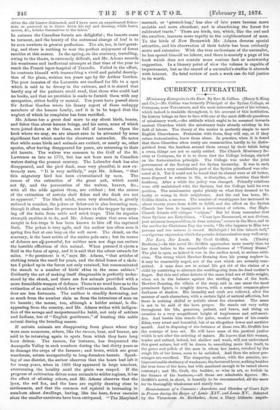Nor Love, Nor Lands. By Cecil Griffith. 3 vole. (Tinsley
Brothers.)—In this novel Mr. Griffith approaches more nearly than he has done before to the remarkable excellences of "Victory Deane." The plot is open, as indeed it was in the earlier novel, to serious criti- cism. The wrong which Hawker Denning does his young nephew is, it may be reasonably urged, not of the sort which are actually com- mitted. A man does not in actual life get rid of the claims of a child by contriving to abstract the wedding-ring from its dead mother's finger. But this and other defects of the same kind are of little weight, when set in the balance against the sterling value of the book. Hawker Denning, the villain of the story, and in one sense the most prominent figure, is roughly drawn, with a somewhat common-place darkness of shadow. His brutality and craft are relieved, after the manner of such characters, with a certain light of natural affection, but there is nothing skilful or artistic about the character. The same is not to be said of the hero proper. He stands out very nobly throughout his life, generous, patient, and bravo, and rising on occasion to a very magnificent height of forgiveness and self-sacri- fice. And beside him stands the paler, weaker figure of his cousin Eden, very sweet and beautiful, but of an altogether lower and earthier mould. And in disposing of the fortunes of these two Mr. Griffith has the courage of true art. He will have none of the poetical justice which is not after the ordering of nature. He knows that this woman, tender and refined, indeed, but shallow and weak, will not understand this great nature, but will be drawn to something more like itself, to the grace and polish of the man in whom her tastes, revolted by the rough life of her home, seem to be satisfied. And then the minor per-
sonages are excellent. The simpering mother, with the genuine, un- impressionable obstinacy of weakness; the favoured lover, nothing besides the true force of the hero, but with manhood enough to be raised above contempt ; and Mr. Croft, the builder, so wise in art, so foolish in the finance of his business,—all these are admirable figures. Mr.. Griffith's novel, in short, is heartily to be recommended, all the more for its thoroughly wholesome and manly tone.


































 Previous page
Previous page